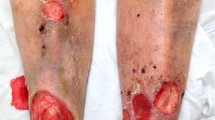Abstract Degradation of extracellular matrix (ECM) components by proteinases is part of the physiological remodelling process during normal wound healing. Excessive degradation of the ECM, however, is likely to create an environment that can no longer support keratinocyte migration and is thought to play a role in the impaired healing of chronic ulcers. Tenascin-C is an ECM component that is markedly upregulated in acute and chronic wounds. Here we report on our investigations into the degradation of tenascin-C in chronic venous leg ulcers. We found proteolytic fragments of tenascin-C in leg ulcer exudate. We also detected fragments of fibronectin in the wound fluid and in addition observed breakdown of fibronectin by wound fluid in vitro, as has previously been reported by others. Wound fluid of four out of six chronic leg ulcers degraded purified human tenascin-C in vitro, and degradation of tenascin-C correlated with high levels of functionally active leucocyte elastase and metalloproteinases in the wound fluid. To identify which proteinases were involved in tenascin-C degradation, we tested the effect of specific proteinase inhibitors. The addition of EDTA or E64 did not protect tenascin-C from degradation, suggesting that neither metalloproteinases nor cysteine proteinases are responsible for cleavage. Tenascin-C breakdown was inhibited by PMSF and SKALP/elafin, and we therefore conclude that leucocyte elastase and possibly other serine proteinases are the tenascin-C-degrading enzymes in ulcer exudate. Taking into account the possible effects of tenascin-C and tenascin-C fragments on cell behaviour, we hypothesize that degradation of tenascin-C could affect the healing process in chronic venous ulcers.
Similar content being viewed by others
Author information
Authors and Affiliations
Additional information
Received: 8 January 1998
Rights and permissions
About this article
Cite this article
Latijnhouwers, M., Bergers, M., Veenhuis, R. et al. Tenascin-C degradation in chronic wounds is dependent on serine proteinase activity. Arch Dermatol Res 290, 490–496 (1998). https://doi.org/10.1007/s004030050341
Issue Date:
DOI: https://doi.org/10.1007/s004030050341




